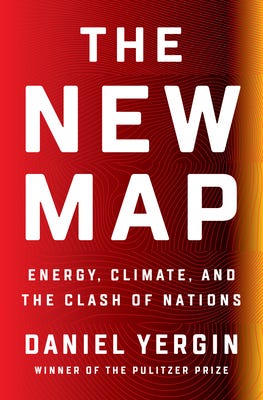Mini Book Review: The New Map [TMP #111]
The New Map: Energy, Climate, and the Clash of Nations
I really like this book.
Hi, I’m Dayo and welcome to The Mind Palace :)
I write about the good books I read. Given my interest in energy and the energy transition, we have a pick. The New Map: Energy, Climate and The Clash of Nations by Daniel Yergin.
It’s a lot and I’m not done, but it’s a good one.
Short Take
Partly an introduction to foreign policy, fully an explainer on the relationship between natural resources, the trade of energy commodities, and the power that comes from being the seller in that transaction. And I love that. What made this book excellent for me was that it explained how this relationship has played out in the US, Russia, China and the Middle East. It’s such a top read!
Halfway Through
Now, this book is a huge read. It’s 629 screen pages (544 pages in a physical copy). Regardless of the size, however, The New Map is the best thing I’ve read this year1.
While discussing it in a book club meeting, I had asked how countries without energy resources created and achieved their energy visions. The answer is trade agreements. But what does that mean, and what does that look like? What happens when you’re dependent on this trade (aka energy insecurity)? What could these vulnerabilities look like? What comes with being a buyer? What comes with being a seller? How do you become a seller with influence? How does this trade impact development and social stability within a country since energy literally powers economies? This book did a great job answering these questions and more.
So far, I have appreciated the depth of study on multiple countries, not just the US. America’s New Map, the section about the US and its ‘salvation’ by shale, speaks unabashedly of innovation and entrepreneurship. I understood Russia’s Map to be one of questionable state control, geopolitical sway over Europe, and diversification as security by Europe. I found the state control here to be questionable because while state involvement in wealth creation and distribution generally has benefits, the book subtly criticises it. In contrast, the state control in China’s Map is illustrated as simply important to China’s development and vision.
To some extent, I have also gotten to understand what economic exclusion means through sanctions against Russia and Iraq. It’s devastating. I wonder if there are other ways to enforce cooperation or compliance without being so punitive to millions of people.
I could go off on the many things I continue to find interesting, like the importance of geography (land, ocean, air and the trade on those routes) in what makes up a country’s riches. In the midst of this, maybe Africa’s energy map is slowly being written (positively) as the energy transition unfolds. We’ll see.
Pick up a book today,
Dayo :)
S/O to the book club that recommended it.



Thanks for your wonderful review.
Adding this book to my next read!
Love the energy, Dayo.
I might just pick up the book!
I pray you find more gems like it! ;)